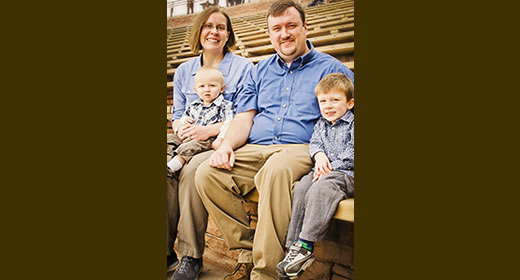
It was a scene that began like so many others: Kay (Milewski) Kelly (MPA '05) and her husband had just brought home their three-day-old son from the hospital. Waiting to welcome the newest member of the family, along with a homemade birthday cake, was Kay's oldest son and a house full of relatives. But as everyone sat down to dinner and a round of "Happy Birthday," the phone rang. It was the pediatrician: not fully seventy-two hours old and her newborn had tested "off the charts" for what Kay and her family now know is MCADD.
Newborn screening: What it is and why you may not have heard of it.
Medium-chain Acyl-CoA dehydrogenase deficiency (MCADD) is a genetic metabolic disorder found in 1 out of 15,000 newborns. In babies with MCADD, a broken or missing enzyme renders the body unable to oxidize fatty acids—turn fat into energy—and can cause severe hypoglycemia if the body goes without food for long periods or isn't properly hydrated during illness.
"His body treats them [fatty acids] like toxins and gets rid of them, so he can't rely on stored fats for energy like we do," says Kay of her son, whom she describes as a healthy, happy 15-month-old. "He's going to be fine, and it's all because we found out. The first week of life can be very dangerous, illnesses can be very dangerous. And if we hadn't known better, we could have lost him. It's something that we're really thankful we know about."
Kay is talking about newborn screening, which tests every baby born in the United States for serious but treatable health disorders and conditions. While all states perform newborn screenings, the specific conditions screened vary from state to state. Most states screen for 29 of the 31 conditions on the Recommended Uniform Screening Panel, developed by the Secretary of Health and Human Services' Advisory Committee on Heritable Disorders in Newborns and Children (SACHDNC) in 2006. There are thirty-one disorders in the screening panel to date, says Kay, and every one of them is treatable if identified early. "All children who screen positive for a condition benefit from treatment and learning that they have the condition," she explains.
Screening tests exist for nearly sixty conditions, but less than a decade ago, some states tested for as few as four. "I think [newborn screening] is one of the greatest public health advancements of the century, but it's a largely unknown program," says Kay.
The screening process is simple: between twenty-four and forty-eight hours after an infant is born, a hospital technician pricks the heel of the newborn and blots the emerging drops of blood with filter paper. The blood spots are then sent to a state laboratory for testing. If the results come back abnormal, or outside of the normal range, the parents are asked to follow-up with a healthcare professional or specialist.
Screening also includes a hearing test and, in some states, pulse oximetry for heart defects. The screenings, and knowledge about potential diagnoses, can be lifesaving. Yet newborn screening isn't on the radar of many parents. "Parents receive so much information during pregnancy that newborn screening often falls to the bottom of the list," says Kay. "Most prenatal classes don't even cover newborn screening and hospitals tend to just hand you a brochure while they're performing the screening. Like many other public health programs, people only learn about newborn screening if there's a problem."
On a mission.
Kay and other dedicated parents and organizations are working to change that. Kay blogs regularly at MCADD for Moms, a resource she created for families who have children with the same metabolic disorder as her son. She also applied to become, and was appointed, a member of the 2013 Consumer Task Force on Newborn Screening, which is a program of Baby's First Test, a federally funded clearinghouse that provides extensive information and resources about newborn screening at the local, state, and national levels for parents and health care professionals.
Active and passionate about child health advocacy issues like newborn screening, the Consumer Task Force comprises parents from across the country. Most task force members have or had children with conditions either detected or that could have been detected through newborn screening. In May 2013, Consumer Task Force members participated in a panel at an international meeting to share the family experience of newborn screening with scientists, medical professionals, and policy makers. In addition to increasing their relationships in the newborn screening and health community during a one-year term, each member also develops and executes a project in her or his home community to raise awareness. Kay constantly educates herself and others about MCADD, newborn screening, and the issues that affect them. She is currently urging her state representatives to reauthorize the newly expired "Newborn Screening Saves Lives Act," which would expand state-level screening programs and keep testing safe.
Kay works as a project manager for the Clean Cities program at the U.S. Department of Energy, focused on transportation policy and the future of alternative fuels. She likes her work and it remains important to her.
But newborn screening advocacy—and educating parents, citizens, and decision makers—has become a full-on mission, and her skills negotiating time constraints, multiple stakeholders, and often complicated information translate seamlessly from one policy issue to the other. So does her desire to make a difference.
"The motivation to get involved comes—a lot—from the Ford School," Kay explains. "I can't just sit back and be thankful about this; I need to go tell everybody about it. I need to talk to the decision makers and express to them how grateful I am and do everything I can to see to it that the progress that's been made in newborn screening continues to help other families like mine." mcaddformoms.blogspot.com/
